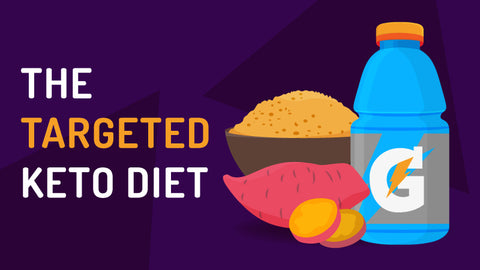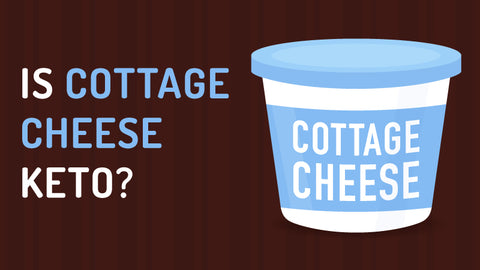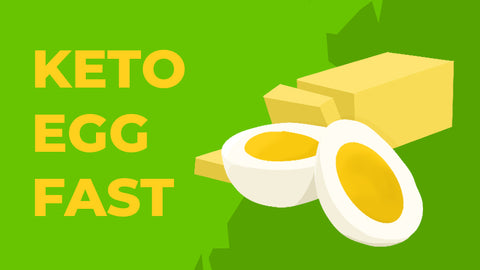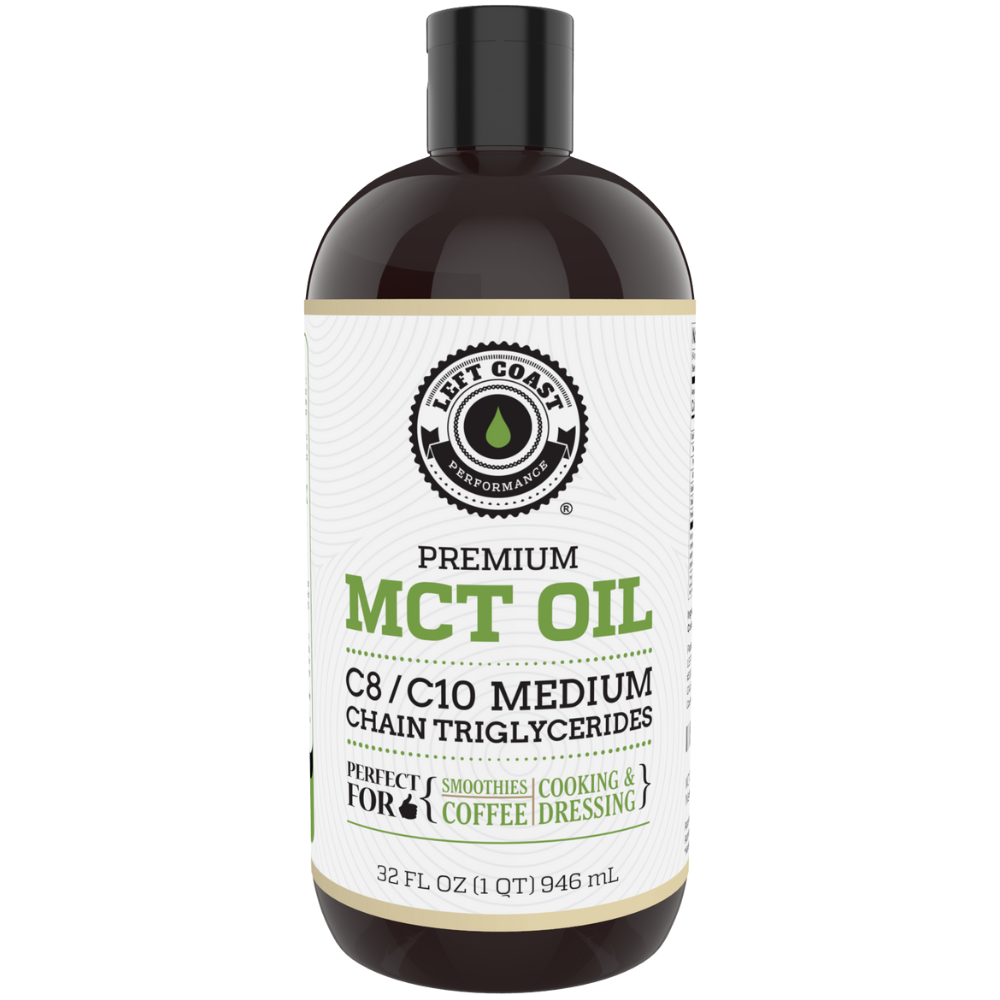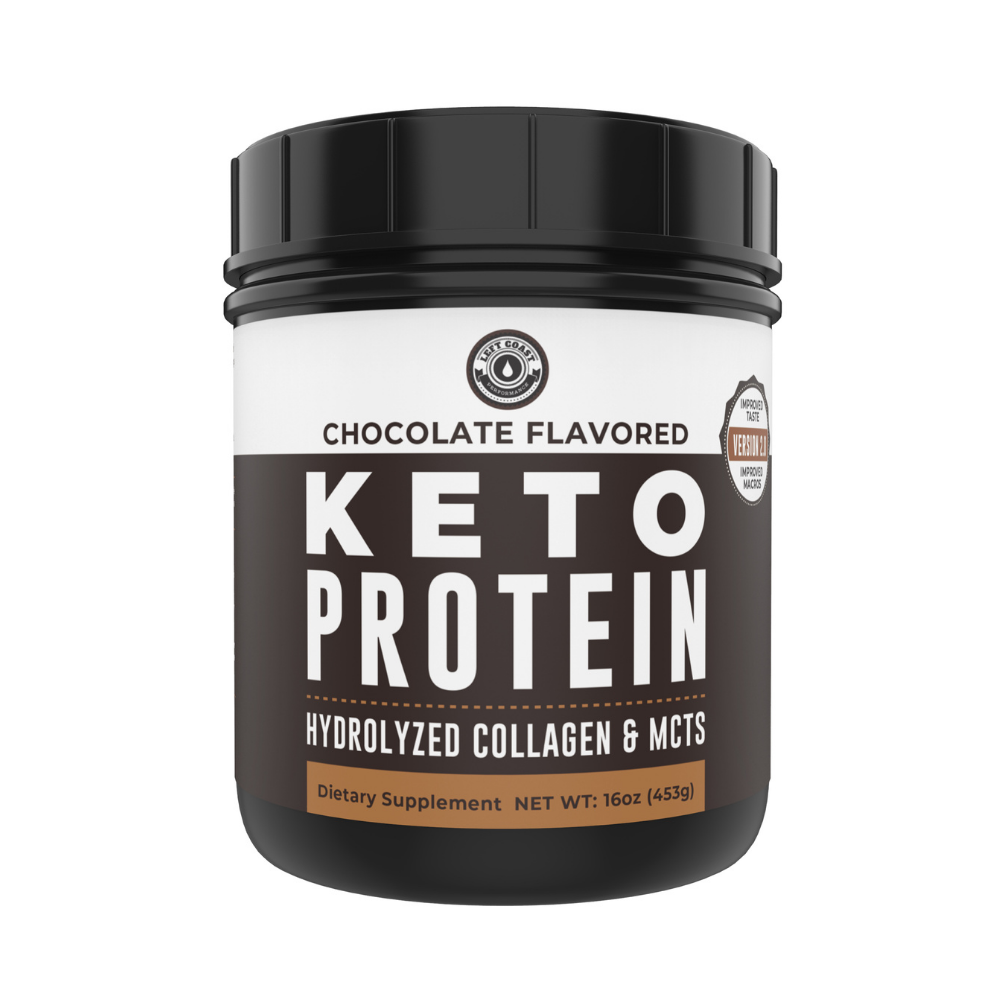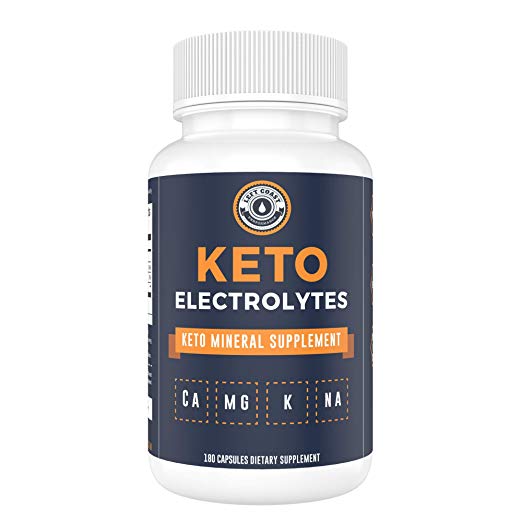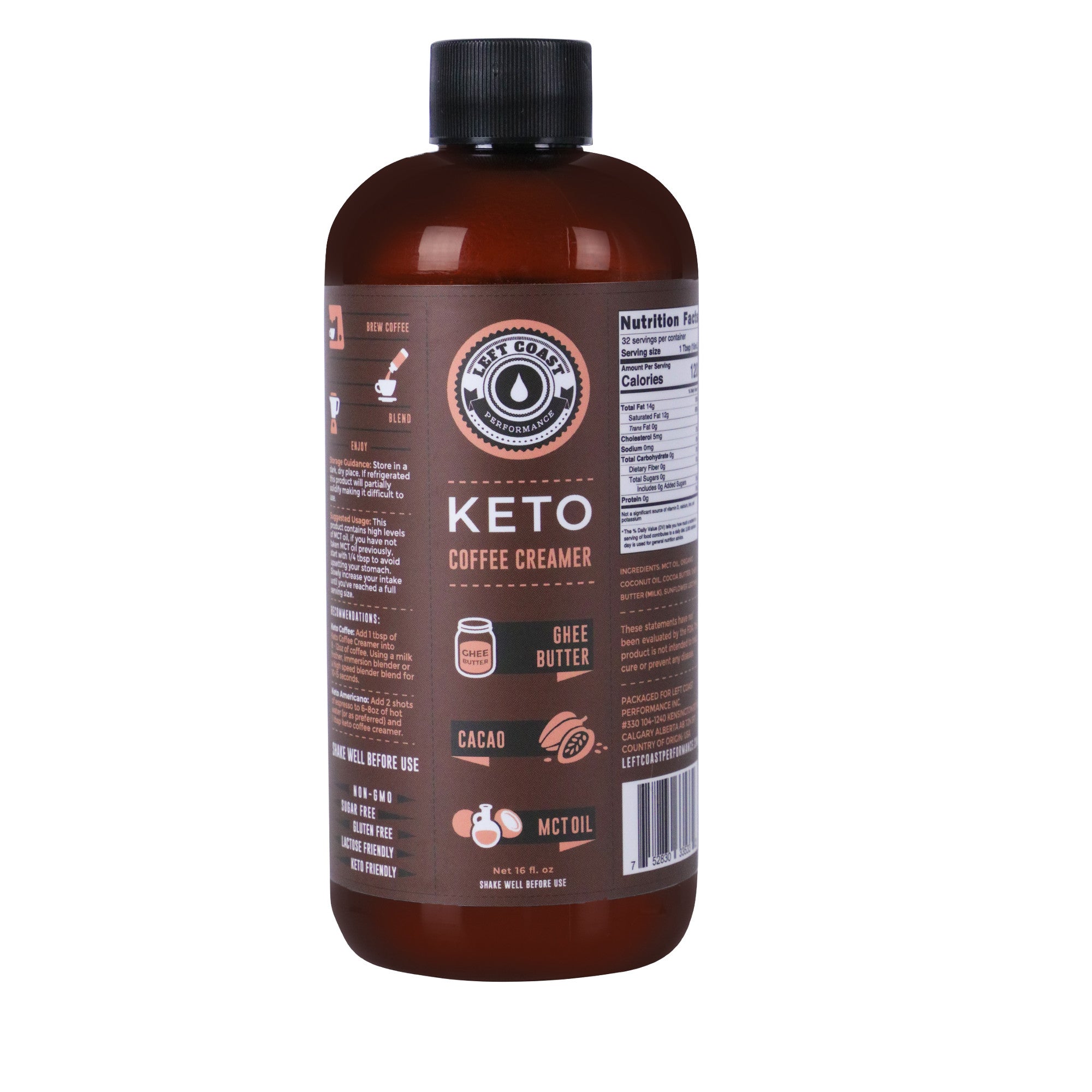Do Calories Matter on Keto? (And Should You Worry About Tracking Them?)
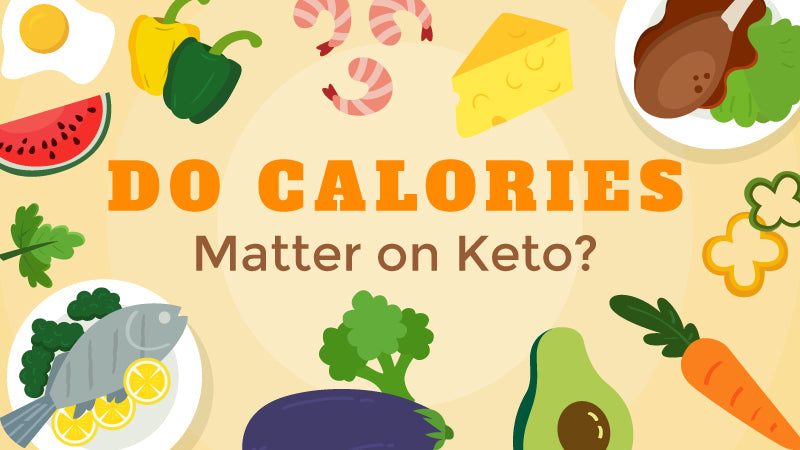
on June 27, 2019
Most weight loss diets focus on tracking or reducing calories in some way to promote weight loss. But, the keto diet is different. There isn’t a huge focus on calorie tracking with keto, it's more about limiting carbs and increasing fat intake to push your body into ketosis. Once your body reaches a state of ketosis, you will tap into your fat stores converting fat into ketone bodies which can be used for energy instead of glucose.
So, do calories matter on keto? And should you be counting calories if you're following a keto diet?
This article will explore the relationship between calories and the keto diet.
Should I Count Calories on Keto?
Calorie counting is not necessarily required on keto, but it can help. It may be especially useful when you are just getting started or if you have reached a plateau. Keeping track of what you eat can help you become aware of what foods work best for you.
Tracking can help you learn portion control and identify foods that are high in carbohydrates. It can help you figure out what is not working. Keeping food records is no different than recording workout progress or creating a financial budget. You can’t make changes or improvements without data. The increased awareness can be helpful.
But, if your goal is to lose weight, instead of tracking every calorie, focus on high quality food that will promote the release of appetite suppressing hormones to reduce hunger and increase satisfaction. Having a meal plan or meal prepping on a weekly basis will help you in this respect.
Make sure you have some convenient keto food available. Avocados, eggs, coconut oil, mct oil, leafy greens and other low carb veggies are just a few staples that are great to keep on hand.
Avoid foods (even keto friendly ones) that are easy to overeat and high in calories, like nuts or cheese.
What is a Calorie?
A calorie is simply a way of measuring energy. The technical definition is that it is the amount of energy needed to raise the temperature of one gram of water by one degree celsius. For the human body, calories are the energy the body uses to live, think, breath, and make your heart beat.
You need a certain number of calories per day to simply survive. Even without moving, your heart is still beating, you have to breathe, your brain has to function.
This basic number of calories you need is called your basal metabolic rate (BMR). It is influenced by your age, gender, genetics, body size, body composition and diet. In addition to your BMR, you need additional calories to support your daily activities, digestion, and exercise.
As we will explain, a high carb diet reduces your BMR while a low carb diet, like the keto diet increases your BMR. By increasing your BMR you increase the basic amount of calories your body will burn on a daily basis.
If you are interested in knowing how many calories you need in total there are many ways to figure this out. Metabolic testing is the most accurate, but does cost money.
If you are calculating it yourself, the Mifflin St. Jeor equation has been found to be the most accurate. It takes into account gender, age, and physical activity. There are many calculators that use this formula available online, you can find one here.
Macronutrients and Calories: Carbs, Protein, Fat
In terms of the food you eat, calories come from three main sources, macronutrients. The macronutrients are:
- Carbohydrates: 4 calories per gram
- Protein: 4 calories per gram
- Fat: 9 calories per gram
If calories were the only thing that mattered for weight loss, following a ketogenic diet to lose weight wouldn’t make sense. On a keto diet you eat mostly fat. In theory, this means you would eat more calories since fat has double the number of calories of carbs and protein.
With this argument, a high carb, low fat diet should be the optimal diet for weight loss. But, there are many reasons why a high carb, low fat diet isn’t ideal, even if it is lower in calories. The calories in versus calories out equation is not as black and white as we originally believed.
A Calorie Is Not Just a Calorie
There is more to the story of how the body loses weight than just calorie intake. Research has found that when calories are kept the same, low carbohydrate diets tend to result in more weight loss than low fat diets. So, it is clear that there is something more going on here than just cutting your calories, here are a few of the other factors that are at play.
Satiety
Satiety is the feeling of fullness or satisfaction after eating. Protein and fat are simply more satiating than carbohydrates.
You may have already experienced this in your own diet. When you eat a breakfast that is just carbohydrates, like a bagel, you find yourself hungry an hour or two later. But, when you eat a breakfast high in fat and protein, let’s say eggs and bacon, even if it has the same number of calories as the bagel, you are not hungry until lunch. This means you will eat less overall, simply because you are satisfied.
Protein is the most satiating macronutrient. The body tends to use protein for cell repair and growth before using it for energy or storing it as fat. It has to be converted into glucose before being used for energy, which takes a lot of effort, so your body avoids doing that if possible.
Fat is also a satiating macronutrient, although not quite as much as protein. The combination of protein and fat on a ketogenic diet may be the reason why appetite is usually suppressed on this diet.
But, appetite suppression due to increased satiety is still a roundabout way to restrict calories and induce weight loss.
Metabolism
Your metabolism, or number of calories you burn in a day, is also impacted by the type of diet you follow. The body can find calories to burn from either carbohydrates or stored fat. Normally, it relies upon glucose (carbs) for energy. The problem is that it cannot store a lot of carbs at once. Therefore, you have to eat every few hours to give your metabolism the energy it needs.
A low-carb diet, forces the body to switch fuel sources. Keeping carbs extremely low gives the body no other choice but to use fat for energy. The great thing is that there are almost unlimited fat stores to tap into, you don’t have to eat every few hours to keep energy up. Simply being able to tap into your own body fat can decrease appetite, lower calorie intake, and lead to weight loss.
Additionally, when the body starts to use fat for energy, it creates metabolites called ketones. One of these ketones is called beta-hydroxybutyrate. Elevated levels of this ketone also increase satiety.
The metabolic shift that occurs with the ketogenic diet is a way to encourage the body to start using up all of those calories stored as fat, helping you lose weight.
Hormones
Hormones, chemical messengers in the body, are also impacted by the foods you eat. The main hormones that influence satiety and weight loss are ghrelin, insulin, glucagon, and leptin.
Ghrelin
When you eat a high protein, high fat diet, a hormone called ghrelin is suppressed. Ghrelin is one of the hormones that stimulates appetite, therefore low levels will make you feel less hungry.
Leptin
A hormone that works opposite of ghrelin is called leptin. It is produced by the fat cells and is the primary signal to the brain to stop eating. A low carbohydrate diet increases leptin, which could help suppress appetite.
Insulin
Insulin is a signaling hormone. It increases when food is available (ie glucose) and tells the cells to take it in. When insulin is high, calories are being stored and fat is not being broken down. High levels of insulin can lead to weight gain.
A low carbohydrate diet helps keep insulin levels low. This allows the body to tap into stored fat for energy. Lower insulin also results in improved insulin sensitivity, so the body is able to respond more effectively to smaller amounts of this hormone.
Glucagon
Glucagon is released when insulin levels are low. Its purpose is to trigger the liver to release stored glucose, to help keep your blood sugar stable during periods where you aren’t eating, like while you are sleeping.
But, after a few days on a keto diet, there won’t be any stored glucose left. Therefore, glucagon must look elsewhere for an energy source when carbs are not available. This is when it tells the body to tap into stored fat for fuel instead.
These hormonal shifts, caused by alterations in macronutrients and not by reducing overall calorie intake, can help promote weight and fat loss while helping you control your appetite.
Thermic Effect of Food
As I mentioned, calories are a unit of energy. It takes the body a certain amount of energy to use calories. This is called the thermic effect of food (TEF) and it contributes to the total number of calories you burn in a day.
For example, it takes more energy to breakdown protein compared to carbohydrates. The TEF for protein is 25%. This means that of the total calories in the food, 25% of those will be used to breakdown the protein. For carbohydrates, the number is only 8%.
Additionally, the body needs to burn calories if it has to use protein for energy. Protein must first be converted into glucose via a process called gluconeogenesis. This conversion costs a lot of calories, about 400 to 600 per day. Therefore, simply bumping up your protein intake while reducing your carbohydrate intake can significantly increase your overall metabolism.
The thermic effect of food suggests that even if you don’t cut your calories, if you eat a high protein diet instead of a high carbohydrate diet, you may increase your metabolism enough to help you lose weight. Simply modifying the macronutrient composition in your diet, without actually restricting calories, may be enough.
Food Quality Matters
When it comes to health and weight loss, it is not just about macronutrients. Micronutrients, or vitamins, minerals, and antioxidants, also matter.
Micronutrients help our body maintain a healthy metabolism and use the calories from food appropriately. For example, B-vitamins are necessary to help the body more effectively use energy from food. Although a deficiency in these vitamins won’t directly lead to weight gain, it can leave you feeling exhausted ,so you don’t have the energy to prepare healthy food. Other micronutrients like vitamin D and calcium, may also play a role in weight management.
The bottom line is food quality matters. It is not just about calories when it comes to a healthy diet and weight loss. Eating even a high protein diet full of processed foods will leave your body unsatisfied, which may trigger uncontrolled cravings, making sticking to any diet more difficult.
What About Exercise Calories?
Exercise has many benefits. It improves heart health. It is critical for stress management and can make you feel good, so you don’t turn to food for fulfillment. Exercise actively encourages you to make better food choices, reducing the chemical reward of eating unhealthy food.
Resistance training reduces insulin secretion, which can help encourage fat burning. Weight lifting can also help increase metabolism. One study found that after just 26 weeks of resistance training twice a week, metabolism increased by 7%. This would translate to an average of 100 extra calories burned a day. Regular weight lifting can help slow the gradual weight gain that tends to happen as we age.
The thing is that when it comes to burning calories and inducing weight loss in the short term, exercise is not really that effective. First, it is impossible to know exactly how many calories you burned from a specific exercise. So, to say “I burned 200 calories, therefore I can eat 200 extra calories” is impossible to determine. Many people tend to justify overindulgence because they worked out.
Second, exercise doesn’t burn a huge number of calories. For most people, it would take an entire day of working out to burn off 3,500 calories or a pound of fat. This doesn’t seem like an effective use of time.
Although, exercise can be helpful for weight loss, you can't out exercise an unhealthy diet. Instead use exercise for the other benefits, like stress management and lowering your risk of chronic diseases.
How Many Calories Should I eat on the Keto Diet?
Hopefully now you understand that calories aren’t everything - but they do count. If you’re thinking of following a keto diet, how many calories should you eat?
This is going to be very individual. As I previously mentioned, the Mifflin St. Jeor calculation is the most accurate for calculating calories. Here is the equation in case you want to calculate it yourself:
Males: 10 x weight (kg) + 6.25 x height (cm) – 5 x age (y) + 5
Females: 10 x weight (kg) + 6.25 x height (cm) – 5 x age (y) – 161
Once you have this number, you need to multiply it by an activity factor below based on your activity level:
- Sedentary: x 1.2 (minimal exercise, e.g. a desk job)
- Lightly active: x 1.375 (light activity, 1-3 days per week)
- Moderately active: x 1.55 (moderate activity, 6-7 days per week)
- Very active: x 1.725 (hard exercise every day, or exercising twice per day)
- Extra active: x 1.9 (strenuous exercise more than twice per day)
As you can see, the calculation is pretty tedious, so it is just easier to use one of the many online calculators mentioned above.
Now, this will give you the number you need to MAINTAIN your weight. If you want to lose weight you will want to cut that number by 15-25%.
So, let’s say your calorie needs are 1800 a day based on this equation. In order to lose weight on any diet, you would need to eat 1350-1530 calories a day.
The important thing is to have a general understanding of your own individual calorie goals. If you need to, you can adjust how much you are eating to help you meet your goals.
Wrap Up: Do Calories Matter On The Keto Diet?
The bottom line is yes, calories do matter, even on keto. If you take in many more calories than your body needs in a day, any excess will be stored as fat. Following a keto diet is not a “free pass” to eat as much as you want with no consequence.
But, a low carbohydrate or keto diet can make calorie restriction for the purpose of weight loss easier. The hormonal and metabolic shifts that occur when eating low carb, high quality food can help you reach your goals faster.
When you focus on eating real, whole foods that are high in protein and healthy fats, but also loaded with tons of nutrition, this will give you those metabolic advantages that can help you lose weight. This in the long-run will lead you to eating fewer calories, so that you can reach your goals with ease.
FAQs
1. Do you have to count calories on keto?
No, you don't have to count calories. It's more important to monitor your carb intake (net carbs). However, you might find you have more success with keto if you do count your caloric intake.
2. Can you eat too many calories on keto?
Absolutely. If you're trying to lose weight you should still maintain a caloric deficit. If you're trying to gain weight you need a caloric surplus. Keto makes it easier to maintain a caloric deficit for a variety of reasons.
3. How many calories should I eat on the keto diet?
How many calories an individual needs is very dependent on his/her personal goals. You can use a keto calculator to determine how many calories you need to try to aim for.



